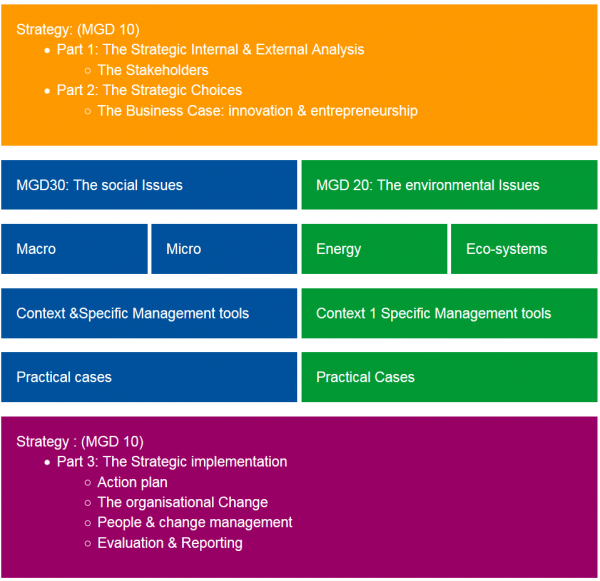Presentation of the Disciplinary Field
Nowadays every company has to think about the social and economic issues linked to its activities : scarcity of the natural resources, ethical management of the suppliers’ chain, staff’s welfare, rational use of energies, waste management and also opportunities to find new markets, new innovation tracks.
The complexity and the heterogeneity of these issues require a coherent and systemic approach deeply rooted in daily corporate management. Even if our economic system is rightly brought into question, we must also think of respecting the spirit of entrepreneurship and innovation in the interest of human development
It is in that spirit that the Sustainable Development Management Disciplinary Field provides training and research in sustainable development management at ICHEC. The programme of the minor organized in the Master's programme, takes into account both the environmental axis and the social and economic axis.
Objectives of the minor in sustainable management
The « minor » New sustainable business models aims at combining on the one hand, a careful thought about the meaning and the impacts of our economic activities with, on the other hand, a model of responsible, profitable and efficient management.
We hope to give our students (in their life as citizens, consumers, future managers and leaders) a responsible spirit, an understanding of the systemic aspects of environmental, social and economic issues while providing them with concrete elements of management intended to develop and spread innovative, ambitious and realistic strategies within companies.
The main objectives of the minor are :
- to develop the understanding of the economic, environmental and social issues.
- to contribute to understanding the issues of sustainable development for the strategic development of a
- company
- to provide appropriate understanding of the tools necessary for the development of a strategy of
- sustainable development and of its daily implementation within the company
- to underline the progress made and opportunities that exist in terms of environmental, social innovation and
- clean technologies
- to provide the necessary knowledge to deal with the evolution of management jobs with a
- particular focus on general management, human resources management, sales management, communication management, financial management
- to stimulate students' critical thinking about their role as individuals, consumers and future managers as opposed to the issues of sustainable development

Pedagogical methodology
The pedagogical methodology is mainly developed around the students’ active participation ( business roles, case studies, readings, debates, team work) followed by the structuring of reflexions and conclusions on analyzed subjects.
We try to harmonize academic knowledge with expertise coming from different actors in the field ( testimonies from company managers, NGO, experts)
The three courses are developed in a spirit of coherence and interaction between the different subjects and courses of volume1 and the seminars, readings and reports of volume 2.
Person in charge of the UFR
Brigitte Hudlot